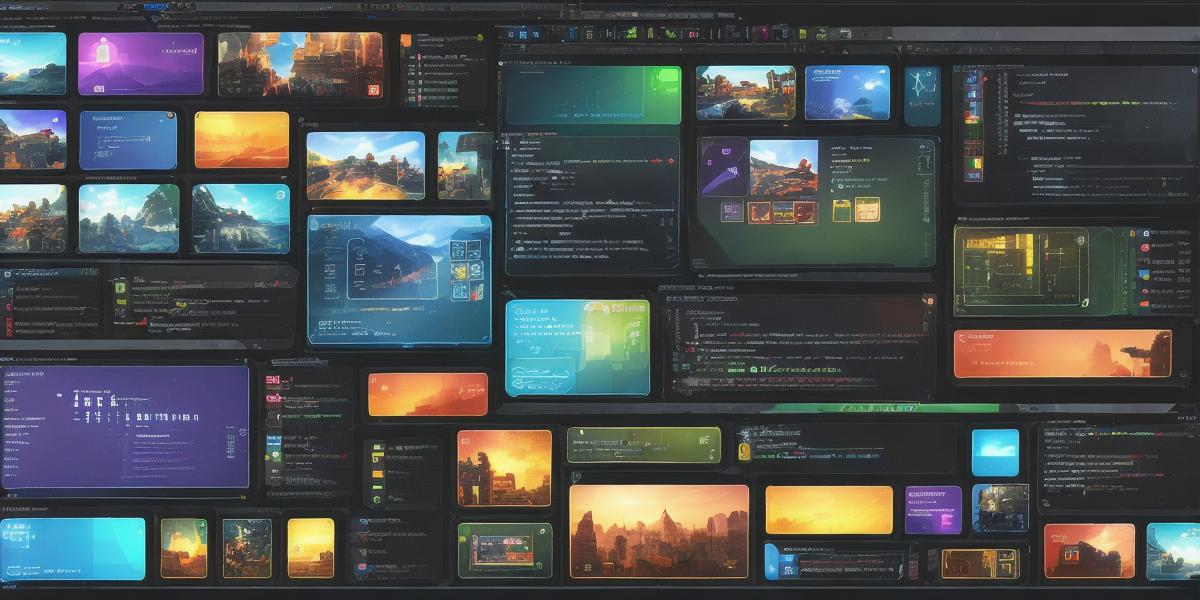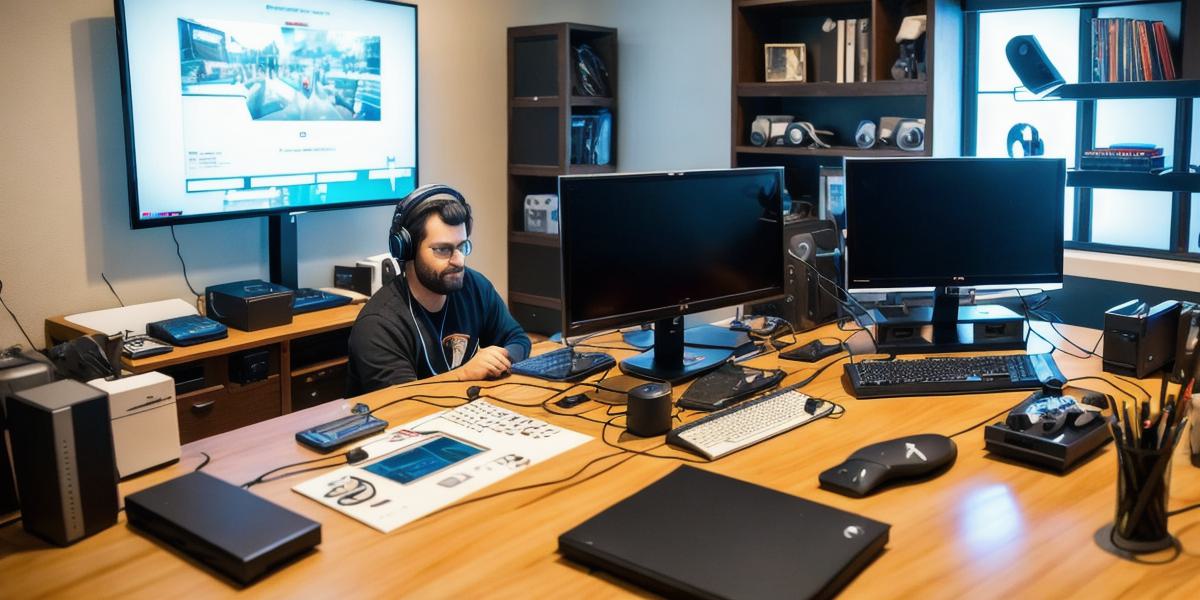Are you considering a career in game development, but feeling hesitant because of the reputation it has for being difficult? You’re not alone. Many people are drawn to the exciting and creative field of game design, but often struggle with understanding the complexities and challenges involved. In this article, we will explore why game development is considered difficult, and provide insights and strategies to help you overcome these obstacles.
Introduction
Game development is a highly competitive and rapidly evolving industry that requires a unique combination of skills and expertise. From coding to creativity, from project management to business acumen, the field of game development requires professionals with a diverse range of talents and knowledge. However, despite the many rewards and opportunities available in this field, it is often considered difficult due to its complexity and high stakes. In this article, we will examine some of the main reasons why game development is considered difficult and offer tips and strategies for navigating these challenges.
- Technical Complexity
One of the primary reasons why game development is considered difficult is the technical complexity involved. Game development requires a deep understanding of computer programming languages, mathematical algorithms, and graphic design principles. Developers need to be proficient in multiple programming languages, such as C++, Python, and Java, and have experience working with specialized tools and software like Unity, Unreal Engine, and Photoshop. Additionally, game development often involves working with complex systems and technologies, such as artificial intelligence, physics engines, and networked programming.
Moreover, the technical complexity of game development is constantly evolving as new technologies and techniques emerge. Keeping up with the latest advancements in these areas can be challenging, especially for developers who are just starting out in their careers. To succeed in this field, you must have a strong foundation in computer science and be willing to continuously learn and adapt to new technologies and platforms.
- Creative Challenges
Another reason why game development is considered difficult is the creative challenges involved. Game design requires a high level of creativity and innovation, as developers must constantly come up with new and engaging ideas for characters, levels, stories, and mechanics. This process often involves brainstorming sessions, prototyping, and iterative testing, which can be time-consuming and emotionally taxing. Furthermore, game design often requires collaboration and communication across multiple teams, including writers, artists, programmers, producers, and marketers, to ensure that everyone is aligned and working towards the same goals.
- Project Management Complexities
Game development projects are complex and require careful planning and execution. Developers must manage multiple tasks simultaneously, work with a large team of people, and deliver high-quality products within tight deadlines. This requires strong project management skills, such as setting priorities, delegating responsibilities, tracking progress, and managing budgets and resources effectively. Additionally, game development often involves working with external stakeholders, such as publishers, investors, and distributors, which can add another layer of complexity to the process.
- Business Implications
Finally, game development is considered difficult due to its business implications. The gaming industry is a highly competitive and rapidly evolving market that requires developers to have a strong understanding of marketing, finance, and strategy. Game developers must be able to anticipate consumer trends, identify new revenue streams, and navigate the complex regulatory landscape of gaming. Additionally, game development often involves working with multiple partners and stakeholders, such as publishers, distributors, and platform owners, which can add another layer of complexity to the business side of the industry.
Case Studies: Real-World Examples of Game Development Challenges
To better understand why game development is considered difficult, let’s examine some real-world examples of the challenges faced by professionals in this field.
- The Da Vinci Code Game: A Case Study in Technical Complexity

In 2003, Ubisoft released "The Da Vinci Code," a puzzle-adventure game based on Dan Brown’s best-selling novel of the same name. However, the development of this game was plagued by technical issues and delays, due in part to the complexity of the game mechanics and the use of cutting-edge technology.
According to an interview with "The Da Vinci Code" lead designer, Jade Raymond, the team faced numerous challenges during the development process, including difficulties in integrating new technologies such as motion capture and real-time rendering, as well as issues with the game’s puzzle mechanics and storytelling. These problems led to significant delays and budget overruns, ultimately resulting in a less than stellar reception from critics and players alike.
- The Witcher 3: Wild Hunt: A Case Study in Creative Challenges
Another example of the creative challenges involved in game development is the creation of "The Witcher 3: Wild Hunt." This open-world role-playing game was developed by CD Projekt Red, a Polish studio known for its work on the popular "The Witcher" series.
During the development process, the team faced numerous creative challenges, including developing a vast and immersive open world, creating believable and engaging characters, and crafting a compelling narrative that would keep players engaged throughout the game’s lengthy playtime. To overcome these challenges, the team employed innovative storytelling techniques, such as branching narratives and dynamic weather systems, which helped to create a rich and immersive experience for players.
- Grand Theft Auto V: A Case Study in Project Management Complexities

One of the most successful and influential games of all time is "Grand Theft Auto V," developed by Rockstar Games. This massive open-world action-adventure game required a Herculean effort from the development team, which numbered over 1,000 people at its peak.
The development process for "Grand Theft Auto V" was characterized by intense project management challenges, including managing a large and diverse team, coordinating the work of multiple departments, and delivering a high-quality product within tight deadlines. To overcome these challenges, the team employed advanced project management techniques, such as agile methodologies and task prioritization, which helped to ensure that everyone was working towards the same goals and that the project stayed on track.
- Minecraft: A Case Study in Business Implications
Finally, let’s look at "Minecraft," a popular sandbox game developed by Swedish programmer Markus Persson. Although "Minecraft" was initially developed as a personal project, it quickly gained popularity and was eventually acquired by Microsoft for $2.5 billion in 2014.
The success of "Minecraft" can be attributed to a combination of factors, including its innovative gameplay mechanics, its massive player community, and its ability to adapt to changing market conditions. However, the game’s success also came with significant business implications, including the need to scale up operations, manage a large and diverse team, and navigate the complex regulatory landscape of gaming.
Strategies for Overcoming Game Development Challenges
Now that we have examined some real-world examples of the challenges faced by game developers let’s look at strategies for overcoming these obstacles.
- Build a Strong Foundation in Computer Science
To succeed in game development, you must have a strong foundation in computer science. This includes a deep understanding of programming languages such as C++ and Java, as well as knowledge of data structures, algorithms, and computer architecture. Additionally, you should be familiar with game engines such as Unity and Unreal Engine, which provide the tools and resources needed to create interactive games.
- Develop Creative Problem-Solving Skills
Game development requires a lot of creative problem-solving, so it’s important to develop these skills early on. This includes being able to think outside the box, approaching problems from different angles, and coming up with innovative solutions to complex challenges. Additionally, you should be able to work collaboratively with others, share your ideas effectively, and give and receive constructive feedback.
- Learn Project Management Techniques
As we’ve seen in the case studies above, project management is a critical aspect of game development. To succeed in this field, you should learn advanced project management techniques, such as agile methodologies, task prioritization, and risk management. Additionally, you should be able to work effectively with others, manage deadlines and budgets, and communicate clearly and concisely.
- Stay Up-to-Date with Industry Trends
The gaming industry is a rapidly evolving field, so it’s important to stay up-to-date with the latest trends and technologies. This includes keeping an eye on new game engines, programming languages, and development tools, as well as staying informed about changes in consumer behavior and market conditions. Additionally, you should be able to adapt quickly to new challenges and opportunities as they arise.
Conclusion: Why Game Development is Considered Difficult
Game development is considered difficult due to the complex combination of technical, creative, project management, and business factors involved in this field. However, by building a strong foundation in computer science, developing creative problem-solving skills, learning project management techniques, and staying up-to-date with industry trends, you can overcome these challenges and succeed in this exciting and rewarding field.



